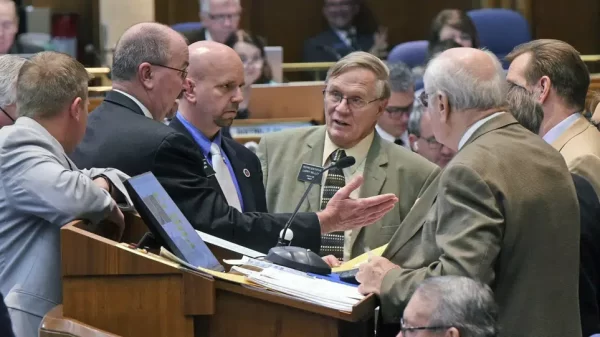FILE – Rep. Matt Gaetz, R-Fla., speaks during the House Armed Services Committee hearing on the fiscal year 2024 budget request of the Department of Defense, on Capitol Hill in Washington, March 29, 2023. House conservatives staged a mini-revolt Tuesday in retaliation for Speaker Kevin McCarthy’s leadership on last week’s vote to raise the debt ceiling, the right wing banding together to block progress on a mixture of bills brought to the floor by Republican leadership.(AP Photo/Jose Luis Magana, File)
WASHINGTON (AP) — House conservatives staged a mini-revolt Tuesday in retaliation for Speaker Kevin McCarthy’s leadership on last week’s vote to raise the debt ceiling, the right wing banding together to block progress on a mixture of bills and vent their frustration.
Led by outspoken members of the House Freedom Caucus, a group of 11 Republicans broke with their party on an otherwise routine procedural vote that threw the day’s schedule — and the rest of the week — into disarray. It’s the first such procedural rule vote to fail in nearly two decades.
The group is among some of the same conservative Republicans who tried to stop the debt ceiling bill from advancing last week and who then threatened to try to oust McCarthy after passage of the debt ceiling package that President Joe Biden signed into law. Short of taking that step, they have demanded a meeting with McCarthy, leaving it unclear how the standoff will be resolved.
“We’re frustrated with the way this place is operating,” said Rep. Matt Gaetz, R-Fla., one of the more outspoken members of the group. “We’re not going to live in the era of the imperial speaker anymore.”
At issue is not just a gas stove bill and others that are now stalled as the conservatives wage their protest, but the political standing of the House Republican majority. Is it just a one-day spat that allows members to make a point or a more lasting fracture?
McCarthy, R-Calif., is working with just a four-seat majority, which gives a small bloc of lawmakers considerable power to gain concessions from him.
“We’re trying to resolve internal tensions within the House Republicans. And from time to time you have to have an airing within your family, and I think that’s part of what happened today,” said Rep. Patrick McHenry, R-N.C.
Just hours earlier, Republican leaders were extolling how the House Republicans had learned to work together as a team after the rocky start of the year and the spectacle of McCarthy’s protracted election to become speaker.
“In sports, it’s called a game plan,” said Rep. Tom Emmer, R-Minn., the top GOP vote-counter and a former hockey coach. “The debt limit last week displayed just how far House Republicans have come as a team.”
What led the conservatives to revolt Tuesday is not fully clear — they outlined a list of grievances over McCarthy’s leadership in handling the debt ceiling package. The House approved the package in an overwhelming bipartisan vote last week, despite objections from the conservatives, sending it to the Senate where it also passed with an overwhelming vote. Biden signed it into law on Saturday.
Rep. Dan Bishop, R-N.C., said the group was now demanding that McCarthy meet with them to hash out an agreement for how the House would operate.
“We had an agreement that had been forged by all of us together, and it was utterly jettisoned unilaterally by the speaker,” Bishop said. “And there’s been nothing so far to address the consequences of that.”
Asked if the protest was about the debt ceiling vote, Rep. Ralph Norman, R-S.C., said, “It’s about a lot of things.” Norman said the group is seeking “what we insisted in January: truthfulness, sincere cuts and putting economic security on the floor.”
Republicans had scheduled a mid-afternoon vote on legislation that would prohibit the use of federal funds to regulate gas stoves as a hazardous product. But efforts to proceed to that matter stalled unexpectedly when the rule setting terms for debate was brought up for a vote. GOP leadership kept the vote open for an extended period as Majority Leader Steve Scalise, R-La., listened to concerns in the back of the chamber from some of his animated GOP colleagues.
Eventually, GOP leadership acknowledged the obvious and it was announced that the procedural vote had failed with 220 lawmakers opposing it and 206 in support. After hours of discussions in McCarthy’s office, it was announced that no other votes were to occur Tuesday.
“We’ve got some more conversations to be had,” said Rep. Chip Roy, R-Texas, as he exited McCarthy’s office in the early evening.
It took McCarthy 14 failed votes in January to become speaker amid objections from the conservative flank — a spectacle unseen in modern times. He finally seized the gavel on the 15th try after making a number of concessions to the Freedom Caucus and other members.
One issue that has frustrated conservatives in particular is an upcoming vote to reverse a Biden administration firearms-related regulation on so-called pistol braces, a stabilizing feature championed by some members of the Freedom Caucus. Some conservatives said House GOP leaders delayed consideration of the bill after members voted against last week’s debt package.
Rep. Andrew Clyde, a member of the House Freedom Caucus and gun shop owner who backed the bill, met with McCarthy on Tuesday afternoon. He said they discussed his pistol brace bill and received an assurance it would get a vote on the House floor next week.
“I will hold them to this promise,” Clyde said in a tweet. “And I will never back down in the fight to defend our natural rights.”
The passage of the debt ceiling bill was hailed by McCarthy and other members of GOP leadership as a crucial first test of their new majority, as they pushed Biden to the negotiating table and forced spending restraints Republicans have long championed in return for lifting the nation’s debt limit.
But dozens of GOP lawmakers voted against the measure, saying it didn’t do enough to restrict spending. And their dissatisfaction spilled over Tuesday on the otherwise routine rules vote — a resolution establishing the rules for debate on various bills coming before the chamber.
It’s common for such procedural votes to pass along party-line votes. Scalise joined with 11 Republicans voting no as part of a procedural step that would allow leaders to later bring the rule back up for a vote.
Copyright 2021 Associated Press. All rights reserved.





























